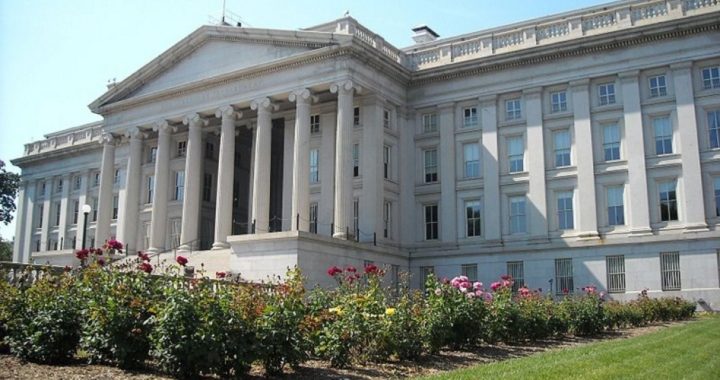
It took more than six months for the Department of the Treasury to answer Utah Republican Senator Orrin Hatch’s questions about how the Treasury would respond to a government shutdown or the failure of the Congress to raise the debt limit. But its response is revealing. Even in the event of a pending default, the Treasury will not be selling any of its gold reserves to pay the government’s bills:
Treasury … considered a range of options with respect to how Treasury would operate if the U.S. had exhausted its borrowing authority.
Treasury considered asset sales … [but] rejected the option of selling the Nation’s gold to meet payment obligations because selling gold would undercut confidence in the U.S. both here and abroad, and would be destabilizing to the world financial system.
When popular and knowledgeable journalist Brett Arends learned about this, he was astonished:
The Treasury’s position is, in a word, extraordinary. We hear all this skepticism these days about gold. Yet the Treasury itself considers U.S. gold holdings to be a key element in maintaining confidence in the country’s soundness — and the stability of the international financial system.
Why wouldn’t the government just dump [its] holdings for whatever it could get?
The admission, according to Arends, is tantamount to confessing that the paper that passes for money isn’t as valuable as the gold it is hoarding:
In other words, according to the official position of the U.S. Treasury, the promises and commitments of the government, and its “full faith and credit,” are actually worth less than gold.
They’d rather default than lose their bullion.
It’s reasonable for Arends to be confused. After all, when then-Representative Ron Paul (R-Texas) challenged Federal Reserve Chairman Ben Bernanke over the matter, Bernanke demurred, backpedalled, and then gave it up, protesting that no, gold isn’t money, but it is considered an important part of central banks’ reserves.
What neither Arends nor Bernanke mentioned was the Washington Agreement on Gold. This classic “gentlemen’s agreement” between members of the banking cartel was signed in 1999 and has been renewed every five years since, where, in a deal signed over lunch among a number of international bankers, gold is determined to be off limits and not for sale unless agreed to privately, in advance.
The reasoning behind the agreement was exposed in a talk George Milling-Stanley — a gold market analyst with the World Gold Council — gave to the 12th Nikkei Gold Conference a month after the agreement was signed:
It is worth asking why such a large group of [international bankers] decided to associate themselves with this highly unusual agreement….
Through our close contacts with central banks … [we’ve learned] that some of the biggest holders [of gold] have for some time been concerned about the impact on the gold price — and thus on the value of their gold reserves — of unfounded rumours and about the use of official gold for speculative purposes.
In other words, certain members of the cartel were deliberately manipulating the price of gold for their own benefit, and something had to be done. Although the agreement is not an enforceable treaty and is of doubtful legality, it was a warning shot to those tempted to engage in such future manipulations.
In a preamble to the 1999 agreement, those going along with the luncheon declaration allowed the then-president of the European Central Bank, Wim Duisenberg, to explain what was really afoot:
Gold has always had and will always have a monetary feature that is not theory, but as real as the 32,000 + tonnes of gold owned by the world’s Central Banks. Central Bankers continue to say little, stating their position once and leaving it at that.
They remain, however, the most important force in the marketplace. It is a commercial reality that holders of a huge item would not sell a small part of it and [as a result] devalue the worth of the remaining balance.
That’s why the cartel had to rein in attempts to manipulate the price of gold behind the scenes for fear of the havoc such moves might cause in the world gold market, potentially affecting negatively the balance sheets of those in the cartel.
But there are other reasons why the U.S. Treasury would rather risk default than unload any of its gold. Julian Phillips, author of the Gold Forecaster, published the official stance on gold taken by the International Monetary Fund (IMF):
It is an undervalued asset held by the IMF, and provides a fundamental strength to its balance sheet. Any mobilization of IMF gold should avoid weakening its overall financial position. Gold holdings provide the IMF with operational manoeuvrability both as regards the use of its resources and through adding credibility to its precautionary balances.
In these respects, the benefits of the IMF’s gold holdings are passed on to the membership at large, to both creditors and debtors.
The IMF should continue to hold a relatively large amount of gold among its assets, not only for prudential reasons, but also to meet unforeseen contingencies. The IMF has a systemic responsibility to avoid causing disruptions to the functioning of the gold market.
This should clarify for doubters like Arends the real reasons the U.S Treasury has no interest in letting go of any of its gold reserves, even if faced with bills that it cannot pay: The only real asset owned by the cartel is gold. Everything else is just paper that is only redeemable in others’ promises to pay. And the Treasury is part of an international understanding that, above all, is designed to protect an international cartel. Regional interests or individual states’ financial challenges do not take precedence over the interests of that cartel.
Photo of U.S. Treasury Building in Washington, D.C.
A graduate of Cornell University and a former investment advisor, Bob is a regular contributor to The New American magazine and blogs frequently at www.LightFromTheRight.com, primarily on economics and politics. He can be reached at [email protected].



